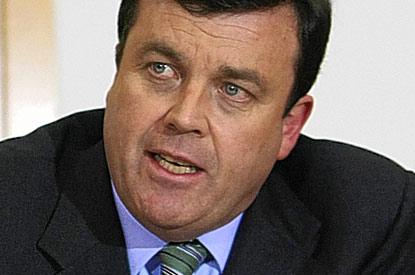My only problem with Brian was his politics

His handling of the banking crisis reflected the variety of politics he practised – not the type of person he was, writes Vincent Browne.
The problem with Brian Lenihan was his politics. No, not that he was a member of Fianna Fáil, but his politics. He was a fine fellow, generous, sociable, funny, clever, articulate, well-read, musical, courageous, committed to this society and us its people. But the politics...
Yes, of course, he did what he believed was in the best interests of the country, it was how he perceived the best interests of the country to be that, in my opinion, was the problem.
I suspect he had his politics thought through quite well, as he had much else. For instance, he was adamant that citizenship in our present circumstances required everyone to share in the pain of the adjustments that had to be made.
I think he thought that solidarity required this, that everyone should be mobilised in the rescuing of the country from the reckless legacy of the governments that preceded him becoming minister for finance and that only through such a national effort could we succeed.
It was an interesting view of citizenship but, I think, a mistaken one for it accepted the structure and power relations of society as they were, as well as the distribution of wealth, income and everything that goes with that distribution.
And in parallel with that acceptance of society as it is – although I am sure he would have wanted to change things but hardly radically – was a reflexive belief that the power of finance was overweening, requiring deference.
When he became minister in May 2008, officials in the Department of Finance were already aware of the possibility of a banking crisis – someone in the department had written a memo dated 24 January, 2008, headed "Financial Stability Issues – Scoping Paper". This was written in the light of the crisis in the UK over Northern Rock.
The paper examined scenarios involving a banking crisis here. It alluded to the vulnerability of the financial institutions to reliance on the property market and went on to suggest alternative responses the State might take to a banking crisis. Its preferred option was to have the distressed financial institutions placed into examinership, under court protection. This could have permitted the financial institutions to continue to function while the problems of liquidity or solvency were sorted out, without the State incurring the massive liabilities that a bank guarantee would entail.
Aside from this paper there were indications, of which the Department of Finance must have been aware in May 2008, that Anglo Irish Bank was in trouble. For instance, the department was fully aware of the crisis within that bank in March of that year arising from Sean Quinn's contracts for difference, because the then minister for finance, Brian Cowen, was contacted, via department officials. And, more critically, the department must also have been aware of the refusal of the National Treasury Management Agency to lodge substantial deposits with Anglo Irish Bank because of apprehensions about the solvency of the bank.
So right from the beginning of his tenure, Brian Lenihan must have been made aware of the possibility of an imminent crisis in Anglo and the possibility of contagion to the other financial institutions. He must also have been made aware of the options in dealing with a banking crisis that were outlined in the paper of 24 January of that year.
And yet, when the crisis broke on 29 September, 2008, his reflex was to give the most extensive possible guarantee to the banks, with the least protection for this society from this going wrong. Brian Lenihan would have seen this to be in the national interest but this view seems to have been informed by a conviction about the sacrosanct character of financial institutions and the subordinate status of the welfare of ordinary people.
A similar reflex seems to have informed compliance with the EU-IMF rescue agreement.
First, the prior four-year plan which promised to inflict austerity on the poorer sections of this society, rather than, for instance, the introduction of the same levels of taxation here that prevail in Germany and France.
Then, the inexplicable surrender to the ECB insistence that Ireland has to pay even the unguaranteed bank bondholders.
That whole negotiation – if it was a negotiation – was framed by denial and then capitulation, maybe influenced by the internal collapse of the government, the ongoing tensions between Brian Lenihan and Brian Cowen and perhaps Lenihan's debilitating illness.
Again, Lenihan's view probably was that defiance of the ECB would not have been in the national interest.
In his politics he was, of course, in the mainstream of Irish political culture that sees subordination to the might of finance and markets, to the detriment of the welfare of ordinary citizens, as in the "national interest".
In his person, however, he was a person apart.
